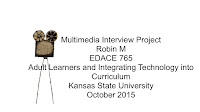This assignment was a stretch for me as I am not
teaching any adult courses right now.
However, I do like to incorporate the history of the English language
when teaching high schoolers, so I chose to base my 8-week course on this
topic.
I will be honest in saying that up until this course,
I thought of wikis as only Wikipedia. I
had no idea the scope of collaboration or uses of a wiki! So for my course wikis, I chose a getting to
know you exercise for collaborative learning, a time-line for knowledge
construction, and a collaborative research paper for critical thinking.
To implement this course would require much more
planning than I could complete in a short time, but this is the general idea. However, I'm still not sure if this fulfills the assignment requirements.
rlm
Unlocking
the History of the English Language
An online course utilizing technology for adults who
would like to learn more about the structure of the English language and
improve their understanding and usage
Required text: Word
Detective: Discovering the History of the English Language by Suzanne
Caraker
Worksheets and Wiki link located within Learning
Management System (LMS)
Week
1: The English Language—ever changing
Required
reading/viewing:
The History of
English in 10 minutes
Wikis in Plain
English
Learning
Activities:
Complete your assigned groups Wiki Icebreaker
Activity: Stem Statements (collaborative
learning) (West & West, 2009)
Objective:
Receive a quick
and humorous overview of the evolution of the English Language.
Familiarize yourself
with the use of Wiki while getting to know your classmates
Week
2:
The three periods of English
Learning
Activities:
Read pp 1-2
Caraker (2004)
Complete
Worksheet 1
Construct a Wiki Timeline for the three periods of
English with your assigned Wiki Group (knowledge
construction) (West
& West, 2009)
Objectives:
Use the workbook and wiki
project to construct knowledge about the three periods of English and history
surrounding them
Week
3:
Anglo Saxon Words
Learning
Activities:
Read
pp 3-14 Caraker (2004)
Complete
Worksheet 3
Additional
handout Root Clues for Identifying Anglo-Saxon Words
Retrieved from http://www4.esc13.net/
Objectives:
Discover the 25 clues for
identifying Anglo-Saxon words
Week
4:
Latin Words
Learning
Activities:
Read
pp. 15-23 Caraker (2004)
Complete
Worksheet 4
Additional
handout Root Clues for Identifying Latin Words
Retrieved from http://www4.esc13.net/
Objectives:
Discover the 16 clues for
identifying Latin origin words
Week
5:
Greek Words
Learning
Activities:
Read pp. 23-27
Caraker (2004)
Complete
Worksheet 5
Additional
handout Root Clues for Identifying Greek Words
Retrieved from http://www4.esc13.net/
Objectives:
Discover the 10
clues for identifying Greek origin words
Week
6: Identifying
Anglo-Saxon words
Learning
Activities:
Complete
worksheets 6-10
Produce flashcards on http://www.quizlet.com using worksheets
6-10. Place words on front with origin
and clue on the back.
Objectives:
Gain proficiency
and confidence in identifying Anglo-Saxon words
Week
7: Identifying
Latin and Greek Words
Learning
Activities:
Complete
worksheets 11-18
Produce flashcards on http://www.quizlet.com using worksheets
11-18. Place words on front with origin
and clue on the back
Objectives:
Gain proficiency and
confidence in identifying Latin and Greek origin words
Week
8 Final Product: Wiki Research Paper: How Technology Has Changed the English Language
Learning
Activities:
Collaborate with your wiki team to produce a wiki
research paper on how technology has changed the English language (critical thinking). (West & West, 2009)
Be sure to cite your references.
Objectives:
Gain understanding
of our ever-changing English language
Rubric
for Wiki grading
Caraker, S. (2004).
Word detective: Discovering the
history of the English language.
www.neuhaus.org
West, J. A., & West, M. L.
(2009). Using wikis for online
collaboration. San Francisco, CA: Jossey-Bass.
 Recently I sat down with Tammy, Director of Teacher Training, at Fundamental Learning Center in Wichita, KS. to discuss their incorporation of distance learning as an option for teacher and parent training in a multisensory structured language program.
Recently I sat down with Tammy, Director of Teacher Training, at Fundamental Learning Center in Wichita, KS. to discuss their incorporation of distance learning as an option for teacher and parent training in a multisensory structured language program.

